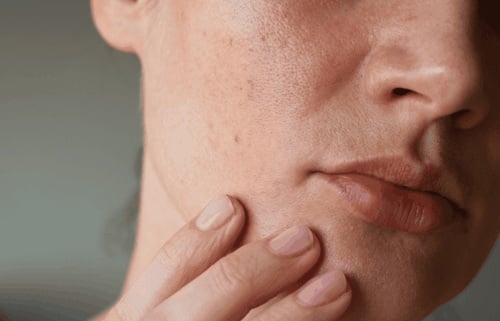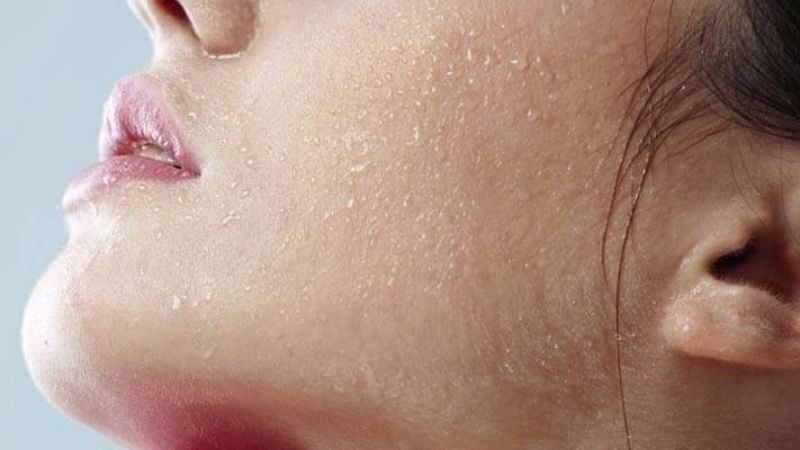1. What is Dry Skin?
Dry skin is a persistent skin type characterized by a deficiency in the natural oils needed to maintain moisture. This leaves the skin feeling perpetually dry, flaky, and tight. It is not a temporary condition but rather a trait that is innate or develops due to long-term age-related and environmental factors.

Dry skin is caused by a lack of natural oils, leading to moisture deficiency.
Signs of Dry Skin
Feeling of tightness and dryness immediately after cleansing.
Rough skin texture with noticeable flakiness, especially on the cheeks and forehead.
Prone to irritation, redness, and occasional small scales.
Tendency towards thinner skin, less oil production, and smaller pores.
Causes of Dry Skin:
Genetic factors and aging, which reduce natural oil production.
Cold weather and low humidity contribute to moisture loss.
Use of harsh cleansing products that strip away the protective layer of oil.
Insufficient hydration through daily skincare routines.
2. What is Dehydrated Skin?
Unlike dry skin, dehydrated skin is a condition where the epidermis lacks water. This can occur in any skin type, including oily skin. When the skin is dehydrated, its protective barrier weakens, resulting in a dull and lackluster appearance, along with premature aging signs.

Dehydrated skin weakens the skin’s protective barrier, affecting its overall appearance.
Signs of Dehydrated Skin:
A tight and dry feeling, yet still producing oil, especially in the T-zone.
Fine lines and a loss of skin smoothness.
Skin appears dull and lackluster.
Increased sensitivity or a tingling sensation.
Causes of Dehydrated Skin:
Dehydration due to insufficient water intake.
Environmental factors such as dry climate, excessive air conditioning, and heating.
Washing with hot water and using products containing drying alcohols disrupt the skin’s moisture balance.
Diet lacking in water-rich fruits, vegetables, and minerals.
3. How to Care for Dry and Dehydrated Skin
Caring for Dry Skin
Use gentle cleansers that do not strip away natural oils.
Apply moisturizers containing ingredients like ceramides and vegetable oils to enhance deep hydration.
Utilize moisturizing masks infused with lipids to improve skin softness.
Always use sunscreen to protect the skin from environmental aggressors.
Caring for Dehydrated Skin
Prioritize hydrating products like toners and serums containing hyaluronic acid and glycerin.
Avoid washing with hot water and minimize the use of products containing drying alcohols.
Ensure adequate daily water intake (1.5 – 2 liters) and consume plenty of water-rich fruits and vegetables.
Use facial mists throughout the day to maintain skin hydration.
Understanding the distinction between dry and dehydrated skin will enable you to choose the most suitable care methods, ensuring your skin remains plump and vibrant.
Does CO2 Fractional Laser Treatment for Acne Scars Really Work? Insights from Em May Skin Center
“Scarred skin, particularly the pitted variety, can be a source of deep insecurity for many. The uneven texture and noticeable indentations can make one self-conscious, relying on temporary cover-ups and feeling anxious about close-up photos or intimate interactions. This common skin concern can become a significant hindrance in one’s pursuit of holistic beauty and confidence.”






































